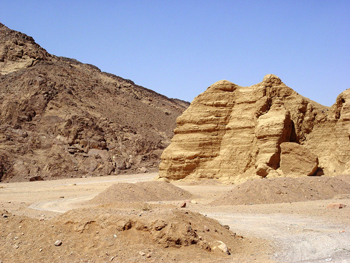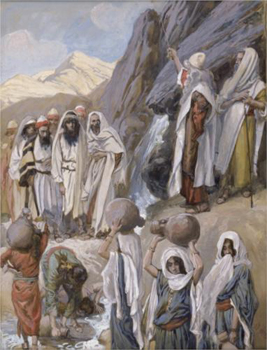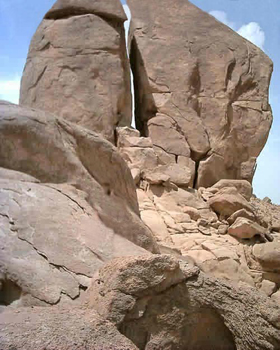God in the Dock
by Debie Thomas
For September 28, 2014
Lectionary Readings (Revised Common Lectionary, Year A)
Exodus 17:1-7
Psalm 78: 1-4, 12-16
Philippians 2:1-13
Matthew 21:23-32
In 2005, Pavel Mircea, a Romanian convict serving time for murder, tried to sue God for breach of contract. "He was supposed to protect me from all evils and instead he gave me to Satan who encouraged me to kill," Mircea contended. In 2007, Nebraska State Senator Ernie Chambers filed his own lawsuit against God, accusing the Almighty (in a fit of alliteration) of "fearsome floods, egregious earthquakes, horrendous hurricanes, terrifying tornadoes, pestilential plagues," and the like. Predictably, both lawsuits were dismissed. Since God doesn't have a legal address, the presiding judges argued, he can't be summoned to appear in court.
Naturally, we laugh at such theatrics. But in this week's reading from the book of Exodus, we encounter a courtroom scene even more dramatic than Mircea's or Chambers'. To use C.S Lewis' trenchant phrase, we find God in the dock. God on trial. God — his legal address notwithstanding — showing up of his own accord to face the accusations of his people.
 |
The Sinai wilderness. Photo ©Leon Mauldin |
The setting is the wilderness of Rephidim. Newly freed from slavery, the Israelites have been traveling from place to place under God's command. They've seen pillars of cloud and fire. They've seen manna rain down from the heavens, and quail appear to ease their hunger.
But now they're camped in the wilderness, water has run out, and dehydration is imminent. As thirst devolves into panic and panic into fury, the Israelites confront their leader — and by extension, their God. "Why did you bring us out of Egypt to die of thirst?" they ask Moses. "Give us water to drink!"
I have to confess that I get irritated sometimes, reading these Exodus stories. "What a bunch of whiners and amnesiacs!" I think. "How could people so drenched in the miraculous still find reasons to complain? What was wrong with them?"
In this week's reading, Moses apparently agrees. "Why do you quarrel with me?" he asks the angry crowds impatiently. "Why do you put the Lord to the test?"
The language Moses uses here is legal language. The Israelites aren't expressing concern; they're lodging a complaint. Essentially, they're taking God to court.
But unlike Moses (or me!) God doesn't respond to his people's complaints with irritation. He responds with empathy, longsuffering, and even playfulness. "You want a trial?" he seems to ask in the astonishing scene that follows. "Fine, no problem. I'll give you a trial."
"Go out in front of the people," he instructs Moses. "Take with you some of the elders of Israel, and take in your hand the staff with which you struck the Nile, and go. I will stand before you by the rock at Horeb. Strike the rock, and water will come."
 |
Moses strikes the rock. |
In other words: assemble your courtroom. Gather your witnesses. Bring the rod of judgment. I will be in the stand, waiting.
Moses obeys, and miracle follows. The writer of Exodus spares us the frenzied aftermath, but we can imagine it, can't we? The mad dash towards the gushing water, the jostling of knees and elbows against the slick rocks? Moses' sigh of relief and gratitude?
I understand the miracle. What's harder for me to understand is God's vast patience. Why doesn't he get angry? Perhaps the answer lies in the story's conclusion: "And [Moses] called the place Massah and Meribah, because the Israelites quarreled and because they tested the Lord saying, 'Is the Lord among us or not?'"
Is the Lord among us or not? Maybe, the ancient Israelites feared, they were all alone. Maybe the Exodus itself had been a mistake. Maybe they'd misread the signs, and God had abandoned them.
At stake was not God's existence, but his presence in the details of their lives: is God with us here in the desert? Is he among us when we thirst? Is God still for us?
The "easy" thing about systems of oppression is that their chains of command are brutally clear. In Egypt, the Pharoah and his slavemasters were in charge, period. In the desert, by contrast, the Israelites faced all the terrors of true liberty. God would not oppress them into trusting him. "I will stand there," God promised Moses, knowing that what the people really needed wasn't water, but his abiding presence. Perhaps the true miracle wasn't God's intervention, but his restraint. Did anyone look past the waterfall that day, and glimpse the Holy One? Scripture says he was standing there, his trial apparently over, and his generous nature vindicated yet again.
God in the dock. God in the shadows. God in the cleft between rock and water. What does it mean that he goes to such ridiculous lengths to honor our liberty, even when that liberty frees us to ignore him?
It's important to note that God led the Israelites to Rephidim in the first place: they "traveled from place to place as the Lord commanded." Our misguided theologies of prosperity notwithstanding, the God who gives us water also gives us the wilderness. The place of strife is also a holy place. And the circumstances that ostensibly point to God's absence are often the ones that reveal his presence most richly.
 |
Cleft Rock. |
When the ancient Hebrews named a place — a grove of trees, a well — they were marking it as significant in their sacred geography. Moses named the watering rock "Meribah," and "Massah." Not, "the source of abundant water" or "the rock where the Lord provided," but a place of trial, contention, and strife. I find it consoling that even this dark spot on the Israelites' spiritual map has a place in the foundational texts of our faith.
Is God among us or not? Foolishly, we ask the question as if its answer should come to us once-and-for-all, so that if God proved his existence thunderously enough, we'd never ask for reassurance again. He won't. And even if he did, this story from Exodus teaches us that we'd ask again, anyway. What the Israelites really yearned for — what we really yearn for — is not God out there in the cosmos. It's God right here, in the messy particulars of our lives. We ask again and again because we need to know again and again. Is God among us now? And now, and now, and now? In the parched marriage, the gut-wrenching diagnosis, the shrinking paycheck, the untimely death? In the war zone, the brothel, the earthquake, the drought? In the scorching, shape-shifting deserts he leads us into and out of for reasons we often don't understand — is God among us or not?
It's the only question that matters. To ask it is to register our need, our yearning, and our hope. To ask it is to journey into radical freedom, knowing that the God of both wilderness and water has compassion enough for our questions. As it turns out, God doesn't need a legal address in order to answer our summons. To our perpetual surprise, he shows up freely and stands before us. He is in the dock, now as ever. Waiting.
Image credits: (1) Bleon1.wordpress.com; (2) Wikiart.org; and (3) Panoramio.com.





